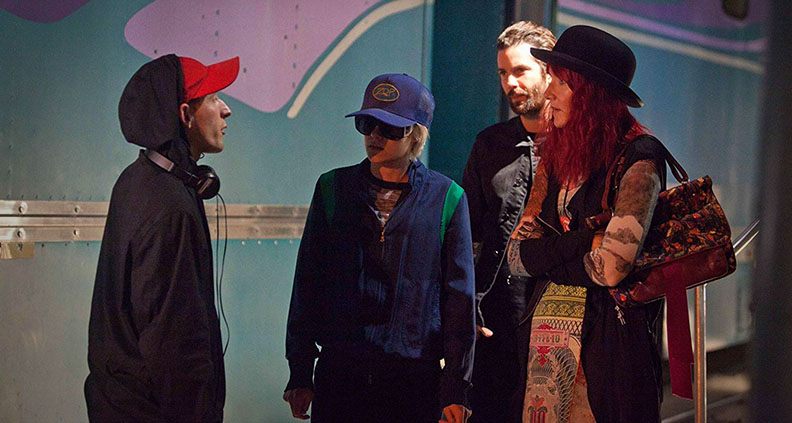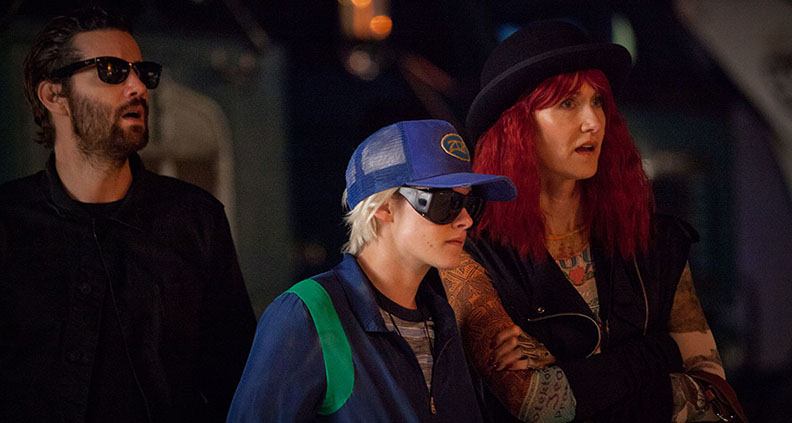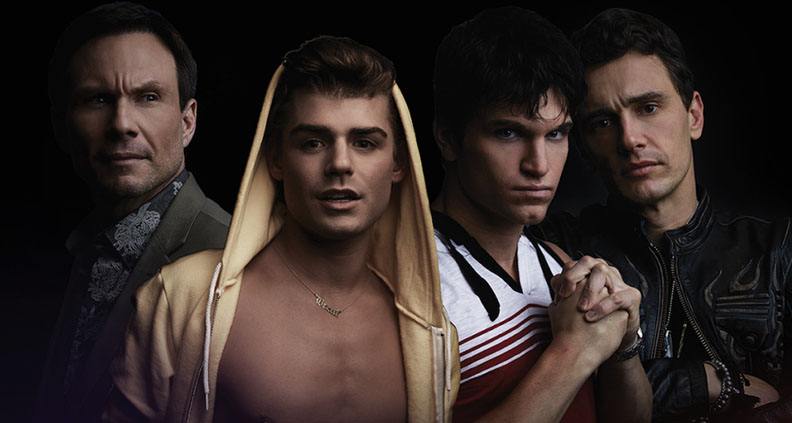‘JT LeRoy’ Director Dramatizes a Landmark Literary Hoax
You don’t need a trend piece in a glossy magazine or upward-ticking hashtag to know that grifters, scammers and con artists are currently having a moment. From dueling docs on the ill-fated Fyre Festival to Alex Gibney’s recent HBO feature about discredited tech CEO Elizabeth Holmes, the zeitgeist is abuzz with true-life tales of self-styled entrepreneurs propelled by hubris and ambition into unlikely positions of power and influence, culminating in grand fiascos that finally bring their masterminds tumbling back down to earth.
Among these stories, the odd saga of supposed literary wunderkind JT LeRoy stands as of the saddest and most convoluted hoaxes of the century thus far—a tale now being retold in director Justin Kelly’s third feature JT LeRoy, starring Kristen Stewart and Laura Dern.
The gist: in early 2000s San Francisco, frustrated 30-someting novelist Laura Albert (Dern) concocts the character JT LeRoy—a young, mysterious, sexually ambiguous young writer with a tortured backstory—to serve as a front for her own work. Albert eventually enlists the help of her androgynous sister-in-law Savannah Knoop (Stewart) to play JT in public. (Knoop receives a co-writing credit on the film JT LeRoy, which is based in part on her autobiography.)
“LeRoy” was soon catapulted into the celebrity stratosphere, befriending hip pals like Courtney Love, Asia Argento, and Gus Van Sant—with whom he/she/they somehow co-wrote the filmmaker’s critically acclaimed 2003 film Elephant.
We recently spoke to Kelly (I Am Michael, King Cobra) about the film, his attraction to dual-identity stories and just why the strange safe of JT LeRoy is so resonate, relatable and enduring.
JUSTIN KELLY

We’re in a moment where scams and grifters are really part of the cultural zeitgeist. How do you thing the JT LeRoy story fits into this moment we seem to be having?
Kelly: Yeah, I don’t know. I noticed that as well and I just felt that it was just one of those random things, this moment we’re in where a lot of people became interested in these sorts of hoax stories. If something or someone you think you know is revealed to be different or a lie, it’s completely fascinating. People feel betrayed and upset and want to know how and why these people pulled off these hoaxes. The most interesting part of all these stories you just mentioned is the how but more importantly the why, which is what I find engaging about them.
Your first film I Am Michael is its own sort of dual-identity story. Why do you think you’re attracted to these types of stories?
Kelly: Funny enough my second film, King Cobra, has similar themes, too. Between I Am Michael, King Cobra and JT it’s all completely accidental. But you do have these stories of dual identity and true stories with queer content set largely in the 2000s. But it’s something I didn’t realize I was that drawn to until JT. I don’t know if it’s because I have a secret dual identity within me or I’m just fascinated by those who do, but I don’t know. It’s a very relatable, human thing. We’ve all thought about or fantasized about being someone totally different.
When did you first become aware of the JT LeRoy story?
Kelly: I’d loved [JT’s debut novel] Sarah, just like everyone else. But I was definitely more intrigued by the character [of JT]. I remember going to the bookstore and thumbing through Vanity Fair and reading “his” interview and seeing his face covered up. It was so mysterious, this whole thing that they [Albert and Knoop] orchestrated. The mystery made it so much more intriguing. I wasn’t obsessed with JT as a writer, but I was obsessed with whatever was going on. People had their suspicions, but I was blown away. I couldn’t believe how much was going on with the backstory.

There was a documentary [Jeff Feuerzeig’s Author: The JT LeRoy Story] that came out in 2016. I was wondering if you saw that or if you purposely avoided it in order to tell your own version of the story?
Kelly: We started the script at the end of 2009. And as with a lot of indie films, it takes a long time to get [everything] together. But we were cast and all ready to go before the doc was finished. Once [the doc] premiered at Sundance, I had a moment where I was kind of nervous that it might take some of our steam away. But when I saw it, it was incredible—that’s all Laura’s point of view, whereas our film is a bit more of Savannah’s perspective. So once I saw the doc I felt really great about our script and where we were with the project.
They’re sort of complimentary. Taken together, they complete the full perspective from both of the major players in the story.
Kelly: It was also nice to have [the documentary] for cast and crew, because a lot of JT’s photos are really hard to get ahold of. There are just the few famous ones that are online. So it’s nice to have that for everyone to see what everyone looked like and what their voices sounded like, all of that.
What was your contact like with the real-life celebrities involved who also appear in the movie? Like Courtney Love, who’s in the film but who was also involved with “JT LeRoy” in real life?
Kelly: You, Gus Van Sant and her and a few other people had the feeling that this [hoax] was too weird to really be upset about. Maybe freaked out for a moment, but they weren’t as upset about as some people had been. We reached out and she loved the idea. Technically she doesn’t really play herself in the film—it’s a little ambiguous—but she liked the idea of coming full circle and being in the film.

All of your films so have queer themes. Do you see JT LeRoy as a gay film? Or if not, how does it fit into that tradition?
Kelly: Hmm. I think that while talking about it with cast, crew, producers, and financiers, no one really saw it as a “gay film.” But it’s always such a fine line. By no means when I say that am I afraid of that, but that sexuality was so much more in the forefront in I Am Michael and King Cobra. This is so much more about identity and finding oneself regardless of sexuality. But it’s a tricky question, to be honest. All I can say is, I hope it can break out there more so than just finding a queer audience. I hope it can find a wider audience because it’s relatable in so many more ways than just sexuality.
I was wondering if you had any favorite con man or scam or mistaken identity movies that maybe informed your work on this film.
Kelly: I love Can You Ever Forgive Me. Everything about it just worked so perfectly to me. The one which was a massive influence on me for JT was Robert Altman’s 3 Women—it’s not really a scam, but it’s a massive shift in identity of someone who truly wakes up thinking that she’s someone else. Ever since I’ve seen that film in the early 2000s I’ve been absolutely obsessed with it.
To learn more about Film Independent, click here and be sure to follow us on Twitter, Facebook, Instagram and subscribe to our YouTube channel.